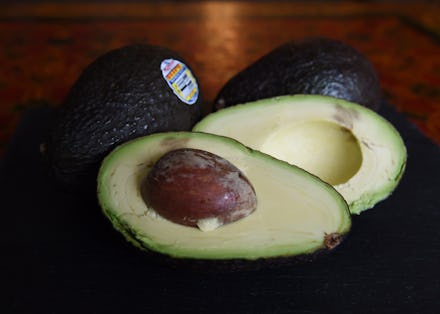15 foods you definitely don't need to buy organic

Splurging for organic groceries may be tempting if you have a little extra cash in your pocket and are trying to make the healthiest decisions for yourself and the environment.
But is that higher organic cost really worth splurging for? Not in all cases. While dissuading you from buying organic is not necessarily these health experts' goal, we asked in-the-know nutritionists about which foods you never need to buy organic.
When making a grocery list, prioritize buying the dirty dozen organic, and go conventional with these items, many of which are the Dean's List siblings of those dirty dozen veggies, The Clean 15. "[The Clean 15] are safe to consume because many of these fruits either have a thick skin or they have an outer layer that can be peeled and removed," Silvia Delgado, registered dietitian at Kaiser Permanente, explained via email. "The pesticide can't get past the thick peel, and so it does not touch the edible fruit inside."
Other foods, like cabbage, cauliflower and eggplant had "very low or no discernible pesticide residue," which makes them also exceptionally safe to buy conventionally.
Ready to save money on groceries? Here's what you can buy inorganically.
Avocados
Buying organic isn't necessarily an avoca-don't, but why bother when you're just tossing the skin?
Sweet corn
Peel off that husk and you're all set!
Pineapples
You're not eating the prickly outside or the core with this one. The hollowed-out shell can be used as a cup, however.
Onions
Stop wasting your money on organic onions.
Mangos
Yet another hard-peeled fruit you can totally buy conventional. And yes, this also qualifies if you're just putting it on your face.
Kiwi
This cute, furry fruit is another Clean 15 grocery item.
Honeydew melon
Honey, do you want to buy this melon organic? Probably not.
Grapefruit
Pesticides aren't getting through that tough grapefruit peel.
Cantaloupe
If you've ever sliced open one of these melons, you know it's tough to cut through. Pesticides have the same problem.
Cabbage
Skip the expensive organic greens and go for the conventional cabbage.
Sweet peas
The outer husk of sweet peas protects them from pesticides.
Papayas
Conventional and affordable homemade papaya salad anyone?
Eggplant
Though conventional eggplant has been deemed safe to eat, know that recent data shows trace amounts of 18 different pesticides on your average eggplant.
Cauliflower
Cauliflower is always a good idea. Make some cauliflower rice with all that conventional cauliflower!
Asparagus
"According to the EWG, asparagus don't attract many insects, so fewer pesticides are used," Delgado explained. "That makes asparagus the least likely food to contain pesticides."
Bonus: Meat
When you're buying meat, you shouldn't be as concerned with pesticides but rather aim to avoid other contaminants, antibiotics and growth hormones, explained Eric Feigl-Ding, nutrition scientist at Harvard SPH Department of Nutrition and leader of nonprofit ToxinAlert.org.
Meat can be antibiotic-free but not necessarily organic, though. Of course, there's much more that goes into meat than just what the animal ingests. "Organic is also about the humane raising and processing of foods too," Feigl-Ding pointed out via email.
If you're concerned about not just nutrition, but animal ethics as well as sustainability and the environment to boot, you may want to consider buying organic from a small farm. "There is a morality issue that is subjective to personal preferences," Feigl-Ding said.
A healthy food you love not on this list? Don't fret. Organic food can be pricey, but if you can't afford it, conventional produce should still makes its way into your shopping cart. "If prices are prohibitive, don't skip your fruits and vegetables all together," Rachel Lustgarten, registered dietitian at Weill Cornell Medicine and NewYork-Presbyterian said via email. "Conventional produce is still chock full of vitamins, minerals, fiber. Wash your produce well before eating to remove debris and sprays."
Lustgarten also encourages shoppers to seek out discounts and coupons for organic food; buy in-season, local produce, which may offer similar prices for organic and conventional varieties; and to remember that frozen or canned organic produce can be a more affordable option.